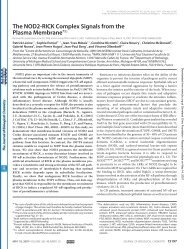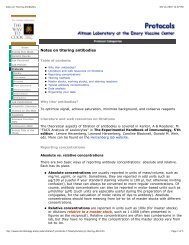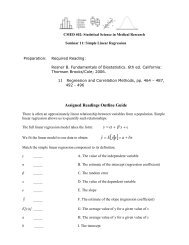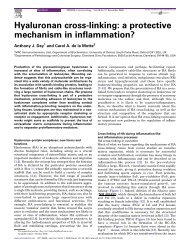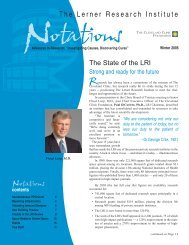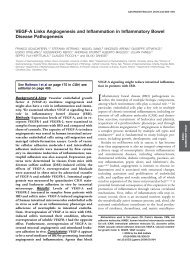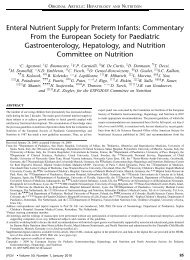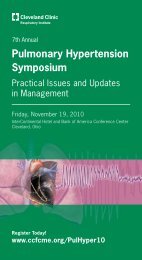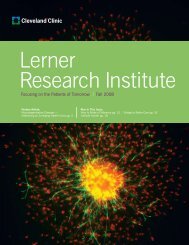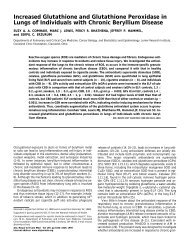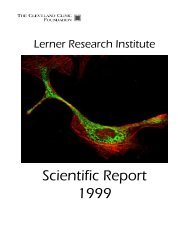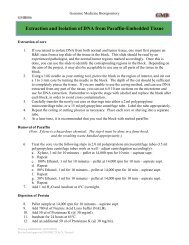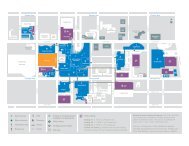Scientific Report 2003-2004 - Cleveland Clinic Lerner Research ...
Scientific Report 2003-2004 - Cleveland Clinic Lerner Research ...
Scientific Report 2003-2004 - Cleveland Clinic Lerner Research ...
- No tags were found...
Create successful ePaper yourself
Turn your PDF publications into a flip-book with our unique Google optimized e-Paper software.
HYBRIDOMA COREHYBRIDOMA COREDIRECTOREarl PopticThe Hybridoma Core was established to provide investigators at the <strong>Lerner</strong> <strong>Research</strong> Institutewith a resource for monoclonal antibody production. The facility also provides consultation services toassist the investigator in all aspects of monoclonal antibody production. Services are performed understrict quality-control guidelines appropriate for antibodies that may have commercial potential.Monoclonal antibodies are extremely valuable tools in both the research and clinical settings.There are two phases of monoclonal antibody production: development of the hybridoma and productionof the monoclonal antibody from the established hybridoma cell line. In brief, hybridoma developmentinvolves immunizing mice with the antigen of interest and fusing splenocytes of B-cell lineage witha mouse myeloma cell. Theoretically, fusion of these two cell types should result in a hybrid cell(hybridoma) that is immortalized and that secretes antibody. Single-cell cloning ensures that thehybridoma cell line is derived from a single clone. Analysis of the supernatant from the cultures by theinvestigators should determine if the resultant antibody has the desired specificity.The second phase of monoclonal antibody production is the actual production of the antibodyfrom the established hybridoma cell line. Several in vitro and in vivo methods are available. TheHybridoma Core offers three methods for monoclonal antibody production from hybridoma cell lines,two in vitro (tissue culture and the Integra system) and one in vivo (ascites production). In the last fewyears, there has been a move in the scientific community to seek alternative methods to avoid orminimize the use of animals in research. The Core will only use the ascites method if the in vitro methodsfail and if the investigators receive approval by the CCF’s Institutional Animal Care and Use Committee.The majority of hybridoma cell lines will grow in vitro; the choice of method depends on the amount,concentration, and purity of antibody required.The Hybridoma Core offers both stationary (T flasks) and suspension (roller bottle/spinner flasks)cultures. The Core is now able to offer both the Integra flask system and the hollow fiber bioreactormethod. In this system, the cells are maintained in a compartment separated from the media reservoir bya selective membrane, and the antibody is secreted in a relatively small volume of the extracapillaryspace. The advantage of these systems is that the antibody is much more concentrated and of highpurity.The Core also offers polyclonal antibody production, on a limited basis. Once the new BiologicalResources Unit facilities are completed in <strong>2003</strong>, the Core plans to expand this service, increasing thenumber of species or offering both monoclonal and polyclonal antibody production.Website: http://www.lerner.ccf.org/services/hybridoma/FLOW CYTOMETRY COREFLOW CYTOMETRYCOREDIRECTORRobert L. Fairchild, Ph.D.MANAGERCathy StankoSUPPORT PERSONNELDolly KlingmanCONSULTANTAnne CotleurThe overall goal of the Flow Cytometry Core Facility is to provide investigators in the <strong>Lerner</strong><strong>Research</strong> Institute, the Taussig Cancer Center, and clinical investigators throughout the <strong>Cleveland</strong> <strong>Clinic</strong>Foundation with a resource for analytical and preparative studies of cells using flow cytometry. The Coreutilizes two FACScans for analytical studies of cells and a FACSVantage for cell sorting and applicationsrequiring ultraviolet wavelengths of light.The Core offers many services for the analysis and/or isolation of cells following staining ofcellular proteins or DNA with fluorochrome-labeled reagents. These services include:• Single-, two-, and three-color analysis of cells. List mode acquisition and storage of dataallows for analysis and presentation in many different formats, according to the needs and preference ofthe investigator;• Sterile isolation of selected cell populations on the basis of specific protein expression, cellsize, or DNA content;• Cell cycle/DNA content analysis of cells;• Analysis of cells undergoing programmed cell death or apoptosis using the TUNEL assay;• Studies to detect intracellular Ca 2+ flux following cell surface receptor engagement with ligand.• In addition, the FACSVantage is equipped with an Autoclone device that allows sorting ofspecific cells and delivery of a single sorted cell to each well of a 96-well tissue culture plate.• In October 2001, the Core unveiled service using a 3-laser, 6-color analytical machine. TheBecton Dickinson LSR will allow investigators to stain and analyze up to 6 parameters on a single sampleof cells. This resource ill expand the analysis capability using rare samples of cells, such as those derivedfrom patientsAll acquired data is stored in files linked to the computer network to enable data retrieval fromlaboratory or office computers.Website: http://www.lerner.ccf.org/services/flow/186



